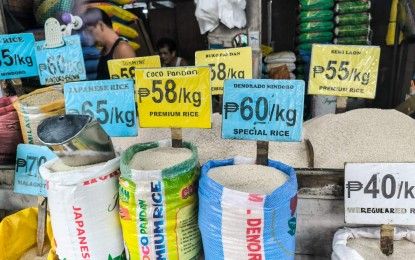The Department of Agriculture (DA) has supported the National Price Coordinating Council’s (NPCC) resolution calling for the declaration of a food security emergency in response to soaring rice prices.
Agriculture Secretary Francisco Tiu Laurel Jr. stated that the resolution is a “critical move” aimed at making rice prices more affordable for consumers.
The price of both imported and local rice, across all grades, has reached concerning levels between P50 to P60 per kilogram in Metro Manila markets.
This sharp price increase has raised alarms, prompting the House of Representatives to launch an investigation into agricultural smuggling, price manipulation, and possible collusion between rice traders and retailers.
Cristina Roque, Secretary of the Department of Trade and Industry (DTI) and Chair of the NPCC, emphasized that the resolution is vital for protecting consumer welfare while supporting local farmers.
“This declaration grants the DTI the authority to take decisive action in safeguarding consumers and bolstering the nation’s agricultural foundation,” she said.
Buffer stocks
Declaring a food security emergency would trigger the release of buffer stocks of locally produced rice from the National Food Authority (NFA), aimed at stabilizing prices.
This power was granted to the DA under Republic Act 12708, also known as the Agricultural Tariffication Act, which was signed into law on December 9, 2024.
Buffer stocks are government-held reserves of rice used during relief efforts or food security emergencies.
Under the new law, the DA is authorized to sell these stocks in areas facing rice shortages or significant price hikes.
The NFA plans to replenish these reserves by sourcing rice from local farmers and cooperatives.
Bringing back NFA’s purchasing powers
Since the passage of Republic Act 11203, or the Rice Tariffication Law, the NFA’s authority to regulate rice trading has been limited.
However, the recent amendment to the law temporarily expands the NFA’s powers in the event of a food security emergency.
Currently, the NFA holds 300,000 metric tons of rice in buffer stocks.
Releasing these reserves would help alleviate congestion in warehouses ahead of the February harvest, according to the DA.
In addition to this measure, the DA plans to cap the price of 5-percent broken imported rice at P58 per kilogram starting January 20.
This is part of their broader strategy to reduce local rice prices while ensuring fair earnings for farmers.
Lawmakers unconvinced
However, the House joint committee investigating the rice price increase criticized the P58 price ceiling during a hearing on January 15, calling it “unrealistic.”
Lawmakers pointed out that some markets sell rice for as low as P40 to P45 per kilogram, with Kadiwa outlets offering rice at P40 per kilo through a government program.
DA Undersecretary Asis Perez clarified that the P58 price ceiling will only apply to a pilot program in Metro Manila.
Despite this clarification, some lawmakers remained unconvinced, arguing that the price ceiling was based on inflated market prices rather than actual production costs.
Photo Courtesy: PNA
#WeTakeAStand #OpinYon #OpinYonNews #DA #NPCC #FoodSecurity

